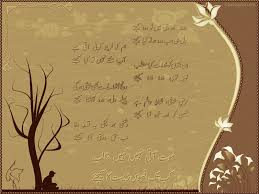Mirza Ghalib Urdu Poetry Biography
Source (google.com.pk)
Mirza Asadullah Baig Khan (Urdu/Persian: مرزا اسد اللہ بیگ خان) was a classical Urdu and Persian poet from India during British colonial rule. His also known as 'Mirza Asadullah Khan Galib', 'Mirza Galib', 'Dabir-ul-Mulk' and 'Najm-ud-Daula'. His pen-names was Ghaliband Asad or Asad or Galib. During his lifetime the Mughals were eclipsed and displaced by the British and finally deposed following the defeat of the Indian rebellion of 1857, events that he wrote of. Most notably, he wrote several ghazals during his life, which have since been interpreted and sung in many different ways by different people. He is considered, in South Asia, to be one of the most popular and influential poets of the Urdu language. Ghalib today remains popular not only in India and Pakistan but also amongst diaspora communities around the world.
Ghalib started composing poetry at the age of 11. His first language was Urdu, but Persian and Turkish were also spoken at home. He got his education in Persian and Arabic at a young age. When Ghalib was in his early teens, a newly converted Muslim tourist from Iran (Abdus Samad, originally named Hormuzd, a Zoroastrian) came to Agra. He stayed at Ghalibs home for 2 years. He was a highly educated individual and Ghalib learned Persian, Arabic, philosophy, and logic from him.
Although Ghalib himself was far prouder of his poetic achievements in Persian, he is today more famous for his Urdu ghazals. Numerous elucidations of Ghalib's ghazal compilations have been written by Urdu scholars. The first such elucidation or Sharh was written by Ali Haider Nazm Tabatabai of Hyderabad during the rule of the last Nizam of Hyderabad. Before Ghalib, the ghazal was primarily an expression of anguished love; but Ghalib expressed philosophy, the travails and mysteries of life and wrote ghazals on many other subjects, vastly expanding the scope of the ghazal. This work is considered his paramount contribution to Urdu poetry and literature.
In keeping with the conventions of the classical ghazal, in most of Ghalib's verses, the identity and the gender of the beloved is indeterminate. The critic/poet/writer Shamsur Rahman Faruqui explains that the convention of having the "idea" of a lover or beloved instead of an actual lover/beloved freed the poet-protagonist-lover from the demands of realism. Love poetry in Urdu from the last quarter of the seventeenth century onwards consists mostly of "poems about love" and not "love poems" in the Western sense of the term.
The first complete English translation of Ghalib's ghazals was written by Sarfaraz K. Niazi and published by Rupa & Co in India and Ferozsons in Pakistan. The title of this book is Love Sonnets of Ghalib and it contains complete Roman transliteration, explication and an extensive lexicon.
Ghalib was a very liberal mystic who believed that the search for God within liberated the seeker from the narrowly Orthodox Islam, encouraging the devotee to look beyond the letter of the law to its narrow essence. His Sufi views and mysticism is greatly reflected in his poems and ghazals. As he once stated:
“The object of my worship lies beyond perception's reach;
For men who see, the Ka'aba is a compass, nothing more."
“The Sheikh hovers by the tavern door,
but believe me, Ghalib,
I am sure I saw him slip in
As I departed."
Popular Poems:
A Thousand Desires
About My Poems
Come that my soul has no repose
Ghazal
Gilah Hai Shauq Ko
He was, when it was aught
Heart it is, Not a Brick or Stone
I have seen almost all the possible Troubles in my life
I Will Not Cry
In Her Every Indication
Innocent heart
It is not Love it is Madness
Kiss Me
Let the ascetics sing of the garden of Paradise.
Mirza Ghalib Urdu Poetry


Mirza Ghalib Urdu Poetry

Mirza Ghalib Urdu Poetry


Mirza Ghalib Urdu Poetry

Mirza Ghalib Urdu Poetry


Mirza Ghalib Urdu Poetry


Mirza Ghalib Urdu Poetry


Mirza Ghalib Urdu Poetry


Mirza Ghalib Urdu Poetry


Mirza Ghalib Urdu Poetry

Mirza Ghalib Urdu Poetry
Please give Urdu translation of:
ReplyDeleteThe object of my worship lies beyond perception's reach;
For men who see, the Ka'aba is a compass, nothing more